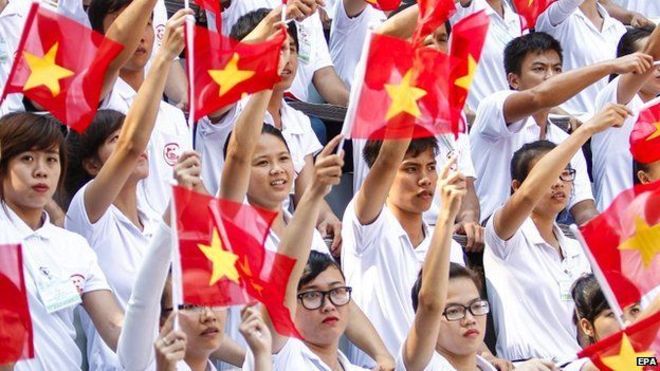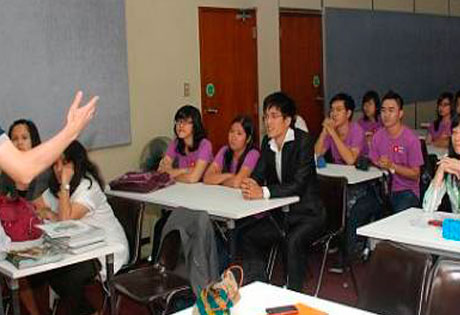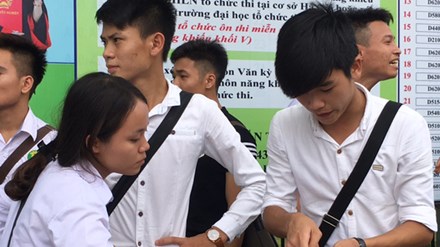Asia/Vietnan/Octubre de 2016/Fuente: Vietnan News
RESUMEN: Un gran esfuerzo para reformar el sistema educativo de la nación y que sea más práctico y relevante ha sido constante durante los últimos cinco años, pero existe el peligro de que esto se puede tropezar en sus propias contradicciones, según los expertos. el propio ministro de Educación Phùng Xuan Nha ha hablado de la necesidad de evitar «reformar las reformas», lo que indica un reconocimiento y conciencia de los problemas que han surgido, estaño TUC (Noticias) informa. El último proceso de reforma comenzó después de una resolución aprobada por el Congreso el 11 de Parte en 2011. Las deficiencias en su aplicación han provocado la ira pública. Por ejemplo, el Ministerio de Educación y Formación (MoET) anunció el mes pasado que introducirían un programa para enseñar chino y ruso, además de Inglés, como lenguas extranjeras obligatorias en las escuelas primarias y secundarias del próximo año escolar. A esto se opuso a varios expertos y padres.
A major effort to reform the nation’s education system and make it more practical and relevant has been ongoing for the last five years, but there is a danger that this can stumble on its own contradictions, experts say.
Education Minister Phùng Xuân Nhạ himself has spoken about the need to avoid “reforming the reforms”, indicating a recognition and awareness of the problems that have arisen, Tin Tức (News) reports.
The latest reform process began after a resolution passed by the 11th Party Congress in 2011. Shortcomings in its implementation have evoked public ire.
For instance, the Ministry of Education and Training (MoET) announced last month they would introduce a programme to teach Chinese and Russian, besides English, as compulsory foreign languages in elementary schools and high schools the next school year. This was opposed by several experts and parents.
Quách Thị Hiệu, mother of a fourth grader in the Nghĩa Tân Elementary School, said “I want my child to learn the language that most countries are speaking. I don’t want her to be a lab mouse for an unreasonable programme.”
Nguyễn Minh Thuyết, a former vice-chair of the National Assembly’s Committee for Youth and Children, had similar concerns.
He said that in the context of global integration, English happened to be the most effective language.
“If other languages, apart from English, are made compulsory, several schools will have to recruit more students to fill up the language classes.
“The result will be that students who do not choose English struggle to find jobs when they grow up, or that many students end up having to learn a language they don’t want to, just because there are too many teachers that teach it, and they have to be given work.
“The education ministry must plan such things very carefully,” Thuyết said.
No rush
According to the management board of the 2008-2020 National Language Project, more than VNĐ3.8 billion was spent over the last five years (2011-2015), 60 per cent of it coming from the State Budget.
However, the project is yet to bring about great improvements in the quality of language teaching at secondary and high schools. Given this, the ministry should not rush into a new language programme, Thuyết felt.
Educational reforms need a strong strategy and a clear route. All solutions must be researched carefully and piloted before being replicated, he said.
Another example of good intentions not producing desired results is the admission process for universities and colleges. The process has been tinkered with very often in recent years.
From the 2015 academic year, the high school graduation exam and the university recruitment exam have been rolled into one. The aim was to reduce expenses as well as academic pressure on students.
The MoET has stated that the single exam would create more opportunities for students, but Đào Trọng Thi, another former member of the National Assembly’s Committee for Youth and Children, said that it did not serve a main goal of the reform process, which is to decentralise and help localities and universities become independent and develop more capabilities.
“The ministry organised one single exam and asked all universities and colleges to follow the process that was planned by the ministry, while there is no regulation that required the ministry to be in charge of this process,” he said.
“The recruitment process should be done by the universities and colleges themselves,” he added.
The MoET has announced that next year’s high school graduation exam will consist of two parts – the first one having three independent tests on mathematics, literature and foreign language, and the second having two interdisciplinary tests: a natural sciences test on biology, physics and chemistry; and a social science test on history, geography and civics.
High school students can use the results of the three compulsory tests in part one, in addition with the results of either the natural science or the social science test, to apply to the universities they want.
While this would offer the students more tertiary choices, senior teachers have pointed out some problems.
At a recent conference on the university recruitment process for next year, Nguyễn Thu Anh, principal of Nguyễn Tất Thành Secondary School, said: “The interdisciplinary tests require students to be adept at almost all subjects, which means teachers must adjust their teaching methods accordingly, so that their students’ knowledge is comprehensive.
“However, since there is an enormous amount of information in each textbook, the education ministry needs to provide teachers with a study guide that they can use to best prepare students for the exams.”
Long-term focus
Referring to reform projects that his ministry has been implementing, Education and Training Minister Nhạ said: “Education and training needs solid strategies with long-term feasibility in order to avoid reforming the reforms.”
He noted that while some reforms take effect immediately, others take years to show results. What is important is that reform work is undertaken with utmost seriousness, with each project piloted and evaluated very carefully, he said.
The minister also said that even though it was badly needed, textbook reform was not being carried out because the overall general education programme and curricula have not been finalised.
He said his ministry wanted “deep and direct” involvement of both teachers and authors in the textbook reform process.
In the meantime, he has ordered textbook authors to revise and remove repetitive and unnecessary content in order to reduce overload on both teachers and students.
Fuente: http://vietnamnews.vn/society/344321/education-reforms-risk-contradiction-experts.html













 Users Today : 11
Users Today : 11 Total Users : 35459606
Total Users : 35459606 Views Today : 25
Views Today : 25 Total views : 3417997
Total views : 3417997